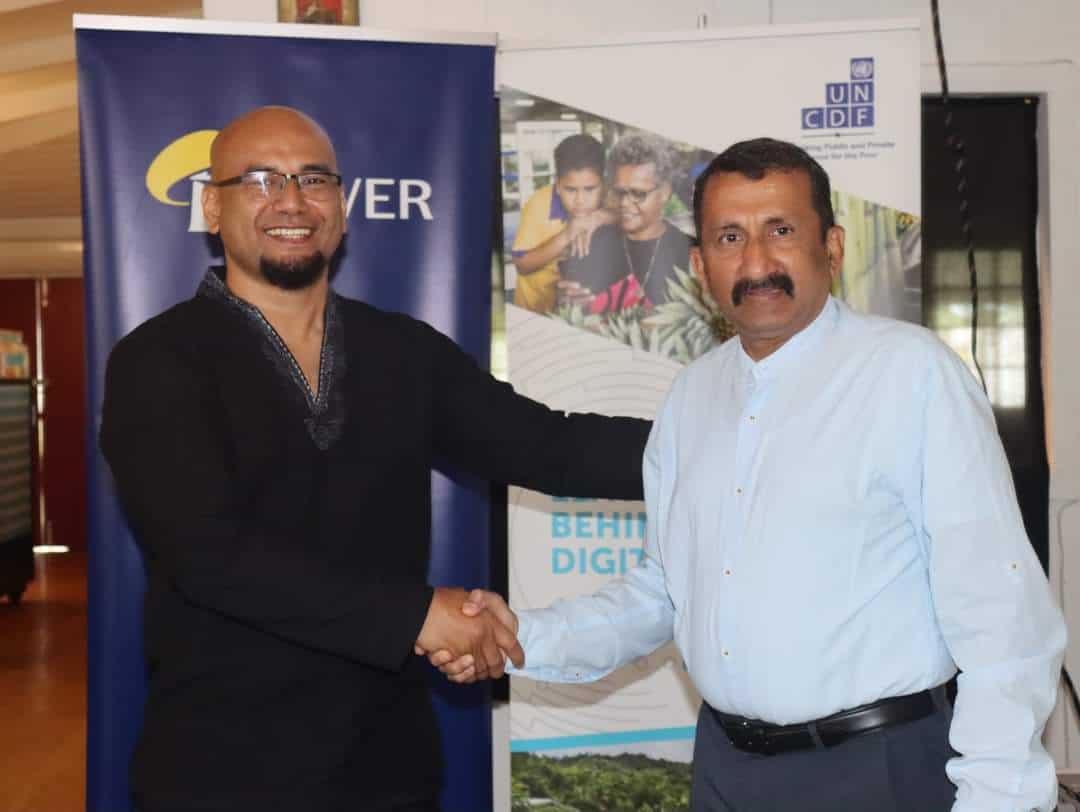500 families in two maritime islands in Fiji will this month join the latest parametric insurance product trial, launched in October by Tower Insurance, the third local insurance provider to offer parametric insurance in Fiji.
Tower’s “Cyclone Response Cover” is being trialed in Ketei village in Totoya island, Lau and Kavala village in Kadavu and provides rapid cash payout to customers in the aftermath of a high windspeed cyclone event in their location during the 2022/2023 cyclone season.
“We are expecting to onboard up to 500 customers for the Cyclone Response Cover pilot. For the launch of the pilot, we onboarded 10 customers from the two villages. We will start onboarding the rest of our customers for the pilot from November onwards,” Tower Head of Pacific Digital Distribution Veilawa Rereiwasaliwa told Islands Business at the launch of its Cyclone Response Cover last month.
“The villages taking part in the initial pilot launch are from maritime provinces, which are located on a common cyclone path. Uptake of typical insurance products in these provinces has traditionally been low, due to a number of factors including affordability. In 2020, Cyclone Harold destroyed a lot of crops and buildings in these provinces, so our customers involved in the pilot immediately saw the value in Cyclone Response Cover, as a low-cost insurance product that offered them peace of mind and financial security.”
Tower joins Fiji Care Insurance and Sun Insurance as underwriters of the products, which are being developed and piloted by the United Nations Capital Development Fund (UNCDF) under its Pacific Insurance and Climate Adaptation Programme (PICAP).
“Our product development capabilities and continued investment in digital transformation projects in the Pacific, leverage off work by local governments to increase internet accessibility, particularly in Fiji. So, this is the right time to launch a parametric product like Cyclone Response Cover,” said Rereiwasaliwa.
Affordability and easy access beng key considerations, Tower’s lowest premium is F$75 per annum and customers have three options ranging from F$1,000 to F$3,000.
“You are guaranteed to be paid out, if a cyclone meets certain criteria in your area, no questions asked, and no insurance assessment needed. We aim to process payments within seven days,” says Mr Rereiwasaliwa.
Parametric insurance is a non-traditional insurance product that offers pre-specified payouts based upon a trigger event, in this case, weather index based events.
Its introduction into Fiji through PICAP is in response to the general lack of finance for vulnerable communities after natural disasters, where in the past, these communities are among the worst impacted and also the most financially constrained during recovery period.
“Cyclone Harold did a lot of damage in our village. We had to use our village’s investment funds to repair the village hall and church. We didn’t have insurance to assist so, this new product will provide some assistance in our recovery,” Tui Kavala, Jona Vulakouvaki said after signing up to Tower’s Cyclone Response Cover.
Ketei villager Ledua Niumataiwalu echoed his sentiments.
“Cyclones bring a lot of damage to our village. Our crops get damaged and we are not allowed to go to sea for fishing. During Cyclone Harold, we ran out of food in the village so, we had to ask our relatives in Suva to assist. This type of insurance will help us buy food and replace or repair our damaged possessions. It just costs a few bundles of fish to pay for the premiums for the whole year,” he said.
Last year’s inaugural launch by UNCDF targeted farmers, fishers and small businesses in the event of a tropical cyclone and was considered a success, with a total of 1388 households covered.
The “extremely positive response” that followed led to improved products this year, according to PICAP Programme Manager and Lead Technical Specialist for the UNCDF in the Pacific Krishnan Narasimhan.
“Last year, we only had a cyclonic storm (heavy wind only) product. Based on feedback from beneficiaries and monitoring visits, we have been able to improve the product offering for the 2022-2023 cyclone season to include a cyclonic storm-heavy wind and heavy rainfall product that meets the needs of several communities,” Narasimhan said.
Underwritten by FijiCare and Sun Insurance, two more products were launched in August this year, both offering micro insurance cover for strong winds and floods – one was for Fiji’s most vulnerable communities, including farmers, fishers, market vendors and small businesses while the second specifically targeted Department of Social Welfare recipients living in high climate risk locations and is being rolled out in partnership with Fiji’s Ministry of Women, Children and Poverty Alleviation and the World Food Programme.
UNCDF also recently launched the products in Vanuatu and Tonga while launches are planned for Papua New Guinea, Samoa and Solomon Islands next year, according to Narasimhan.
